On-page SEO is one of the most important processes you can use for achieving higher rankings in a search engine’s organic results and running successful SEO campaigns.
A website is the focal point of all SEO processes and if it’s not properly optimized for both search engines and users, you minimize your chances of getting traffic from search engines.
In this post you’ll learn everything there is to know about on-page SEO. Follow these tips every time you publish a new post and improve your search engine rankings.
- What is On-Page SEO?
- On-Page SEO Techniques
- On-Page SEO Checklist
- Is On-Page SEO More Important Than Off-Page SEO?
What is On-Page SEO?
On-page SEO (sometimes referred to as ‘on-site SEO’), is the process of optimizing the content of a webpage for search engines. The ultimate goal of on-page SEO is to speak the ‘search engines’ language’ and help search engine crawlers understand the meaning and context of your pages.
Why is on-page SEO important?
On-page SEO is important because it provides search engines with a number of signals to help them understand what your content is about.
During the indexing and ranking processes, search engines try to associate web pages with keywords and search terms users type in the search box.
It’s through on-page SEO elements that you can guide them as to which keywords you want your pages to rank.
In addition, it is called ‘on-page’ because any optimization changes made to a webpage contribute to a better user experience.
On-site SEO is a subset of SEO. Take a look at the diagram below and notice how On-Page SEO intercepts with technical SEO and Off-Page SEO.
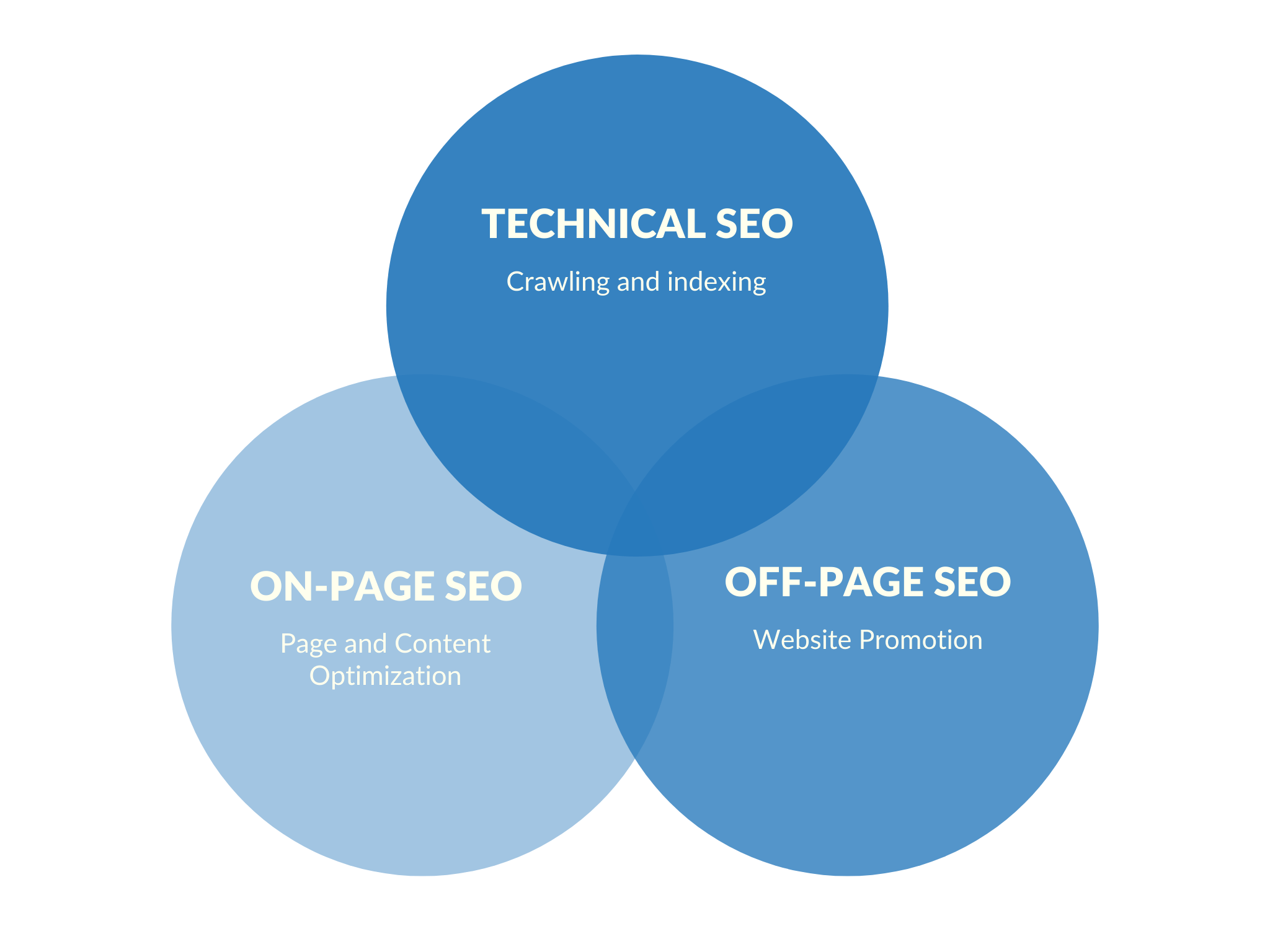
All three processes have to work together to get the best possible outcome, but the main job of on-site SEO is to optimize the content and structure of a particular page.
What is SEO?
Search Engine Optimization is a general term that includes everything you need to do to improve your website’s ranking positions in the top search engines.
This includes optimizing your website for the crawling and indexing phase (that’s technical SEO). Optimization settings you can apply to your pages and content (that’s on-page SEO) and techniques you can use outside the boundaries of the website (that’s off-page SEO).
What is Off-Page SEO?
Off-page SEO is about link building and other signals you can give to search engines to convince them about the quality and usefulness of your website.
It has to do with promotion methods outside the boundaries of your website.
It is highly recommended to watch the on page SEO video for a complete overview of what on page SEO is and how it can help you improve your search engine rankings.
11 On-Page SEO Techniques for Higher Rankings
Now that the theory about SEO and the importance of on-page SEO is justified, let’s move on to the practical part.
Some people can argue that there are more on-page SEO techniques and not only 11, but these are the most important you can apply to your website today and quickly boost your SEO.
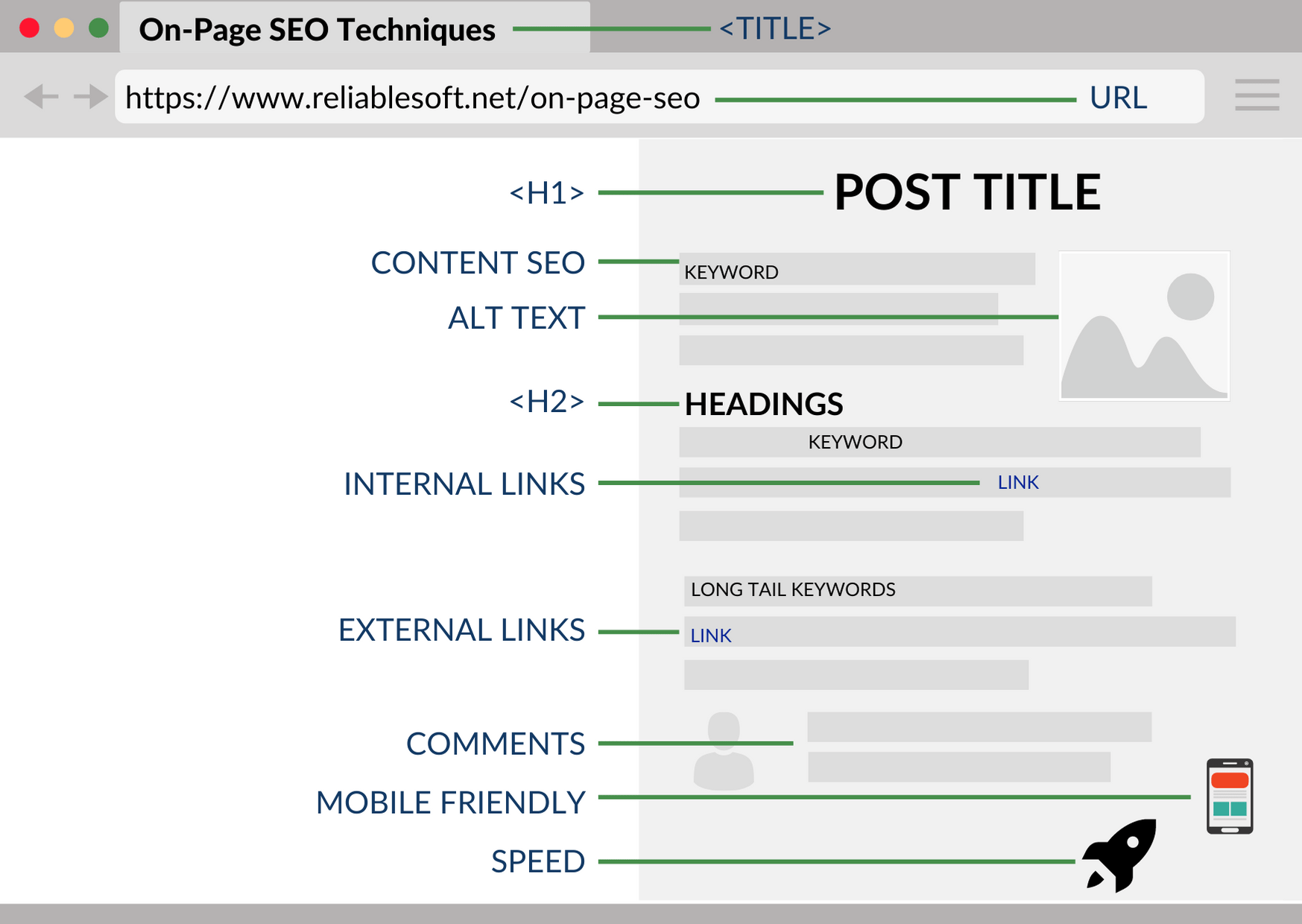
Here is a summary of all on-page SEO techniques:
- Publish high-quality content
- Optimize page titles and meta descriptions
- Optimize page content
- Headings and content formatting
- SEO Images and other multimedia elements
- URL optimization
- Internal links
- External links
- Page loading speed
- Mobile-friendliness
- Comments and on-page SEO
1. Publish High-Quality Content
When dealing with SEO, you always need to have in mind the following:
A website with brilliant content can do great with or without SEO. A website with bad content will not survive with or without SEO. A website with good content can become even better with SEO!
So, what is considered good content? High-quality content has the following characteristics:
Original content (articles, text, images, videos, presentations, infographics, comments, etc.) – No copies or rewrites of existing articles.
Content exclusive for your website – Even if it’s your own content, if you have already published it on another website then it’s not good for your site (unless you specify the canonical tag correctly).
Content that includes text elements – Write text to accompany your non-text content. For example, if you post videos on your website try to add a text description as well. If you add images try to describe in words what the image is all about.
Content that is useful – Don’t publish content for the sake of publishing. Before hitting the publish button make sure that what goes live adds value to your website and readers.
Content that is well researched – Users don’t want to read quickly prepared posts and neither do search engines. Long articles are proven to rank better than short articles.
Unbiased content – If you are writing about a certain topic or answering a question make sure that what you write is justified and covers both sites of a story.
Content that satisfies search intent – Besides the above characteristics, you need to make sure that your content satisfies the search intent. Before publishing any type of content on your website you need to understand what type of content users want to see for a given search query.
In general, the search intent can be categorized into four types:
- Informational – ‘how many calories in an egg?’
- Navigational – ‘Facebook’
- Transactional – ‘buy coffee maker’
- Commercial -‘best SEO courses’
The easiest way to find out what type of content to create is to take advantage of Google because they already did a great job of understanding what users like for different searches.
So, the first step is to go to Google and search for your target keywords. Navigate and carefully examine the top 10 results. Take note of things like:
- The type of content
- The level of detail
- How they use images and video
- Page design
Your goal is to use this information to build better content. Better in this context means a number of things like:
- More thorough and informative
- Easier to read
- Possibly presenting a different view of the subject that is not already covered by the existing content.
Failure to create content that satisfies the search intent will eventually lead to lower rankings. Even if you manage to rank high on Google, this will be only temporary because Google uses different signals to measure whether or not users are happy with the websites shown on the top of the results.
So, before even start thinking about on-page SEO, make sure that the content you create is what a Google searcher wants.
Resources to help you with content creation
- Website content – best methods to create awesome website content
- Content strategy – how to design a content strategy so that you produce high-quality content for your website
- Content marketing courses – the best courses to learn content marketing
2. Optimize Page Titles and Meta Descriptions
This is SEO 101 but very important for on-page SEO. When search engines ‘read’ your pages, among other things, they check the page title and the description of a page.
They do so because they need to understand what the page is all about and then based on other factors (off-page SEO, domain authority, competition, etc.), they will rank your page (for various keywords) in a position in their index.
Page titles
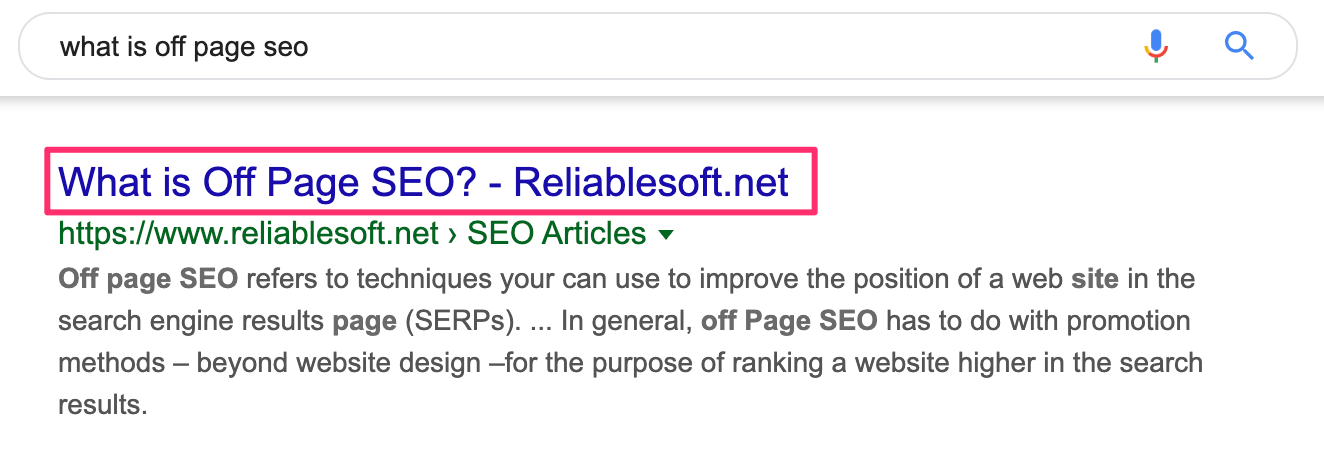
Each page must have a unique title that will help both search engines and users understand what the page is about.
A page with the title “SEO Tips for Beginners” is better than a page with the title “index.html”.
The most important page title optimization tips are:
Add keywords to the beginning of your page titles – When possible add your target keywords to the beginning of your page title. This helps search engines understand right from the beginning what keywords the page is targeting.
That does not mean you should cross the line and start doing keyword stuffing. If you cannot have a keyword at the beginning then it’s not the end of the world. Just make sure that your target keyword is part of the title.
Write short and descriptive titles – A page title doesn’t have to be very long. The general recommendation is to keep it below 60 characters because this is the average amount of characters displayed by Google in the search results.
Include numbers and power words – Having numbers in the title as well as power words like “Ultimate, actionable, amazing, checklist, etc.”, make titles more interesting and this increases their CTR (Click Through Rate).
No need to include your domain in the title – There is no need to include your domain name in the title because this is added automatically by Google. You can make use of the 60 characters to provide an accurate description of the page.
An exception to this rule is when you have a strong brand that people can easily recognize, in this case, you can consider having your domain in the title.
Resources to Learn More
- Page Title Optimization – best practices to follow to optimize your page titles (includes examples).
Meta Descriptions

The page description is shown on the search engine results page (SERPS). It has to be descriptive, up to 200 characters, and unique for each page.
It’s your opportunity to advertise your page and convince users to click your link and visit your website rather than selecting one of the other links.
It should be noted that Google does not always show the custom meta description, but many times they use an automated description if they believe is more useful for the searcher.
The most important meta description optimization tips are:
Avoid auto-generated descriptions – Even though Google may not use your description, it’s always a best practice to avoid using auto-generated descriptions that sometimes don’t make sense.
Add your target keyword(s) in the description – Google still highlights the search terms both in the title and description so adding your target keywords, makes descriptions more relevant and appealing to the searcher.
Resources to Learn More
- Meta Description optimization – learn how to optimize your meta descriptions for SEO
3. Optimize Page Content
Content SEO is part of on-page SEO and has to do with optimizing the actual content for your target keywords.
Before publishing a piece of content (whether this is text, images, audio, or video), the first step is to do your keyword research.
This is necessary to find out what search terms users are typing in the search box and create content that can satisfy their intent.
Once you decide on your target keywords, you should create a list of related keywords (also called LSI keywords), longtail keywords, and use them in your titles, descriptions, headings, and page content.
Why? Because with the introduction of Rank Brain, Google search algorithms have become more intelligent and besides keyword relevancy in content, they are also looking for topic relevancy.
This means that in order to make your content more relevant to broad topics, you need to enrich your content with LSI keywords.
There are various ways to find out which keywords are considered by Google to be relevant to your target keywords.
The easiest and fastest way is to take advantage of three features provided by Google: Google suggests, People also ask for and Related Searches.
Google suggest
When you start typing a query in Google search, you are presented with a list of possible phrases to use in your search. These are great keyword candidates to mention in your content.
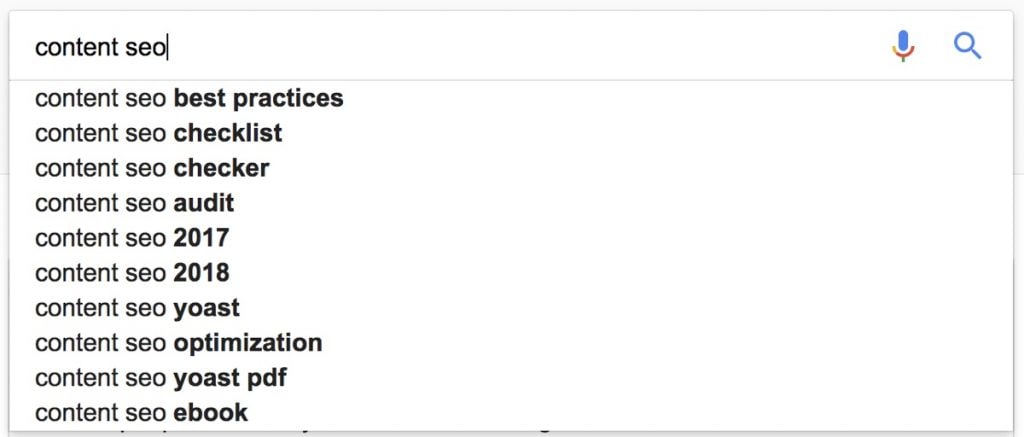
People Also Ask
When you click search, Google shows you the results and among them, a section called “People also ask”. These are good candidates to use in your sub-headings.

Related Searches
At the bottom of the search results, Google shows you a list of related searches.
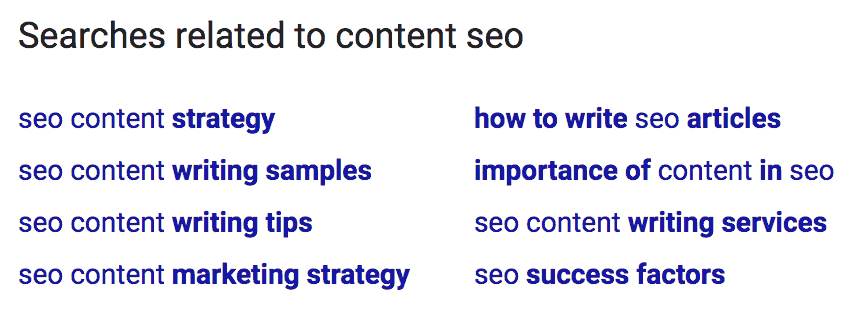
All you have to do is that you mention some of the above words in your content (without doing keyword stuffing).
4. Headings and Content Formatting
A page needs to be properly formatted. Think of it as a report which needs to have a heading (h1) and subheadings (h2, h3).
The H1 Tag
Each page needs to have only one H1 tag. If you are using WordPress then by default the title of a page is wrapped into H1 tags.
You can either choose to have the same <title> and <h1> tag or provide an alternative title for the heading.
Remember that search engines display in the results what they find in the title tag and not the h1 tag.
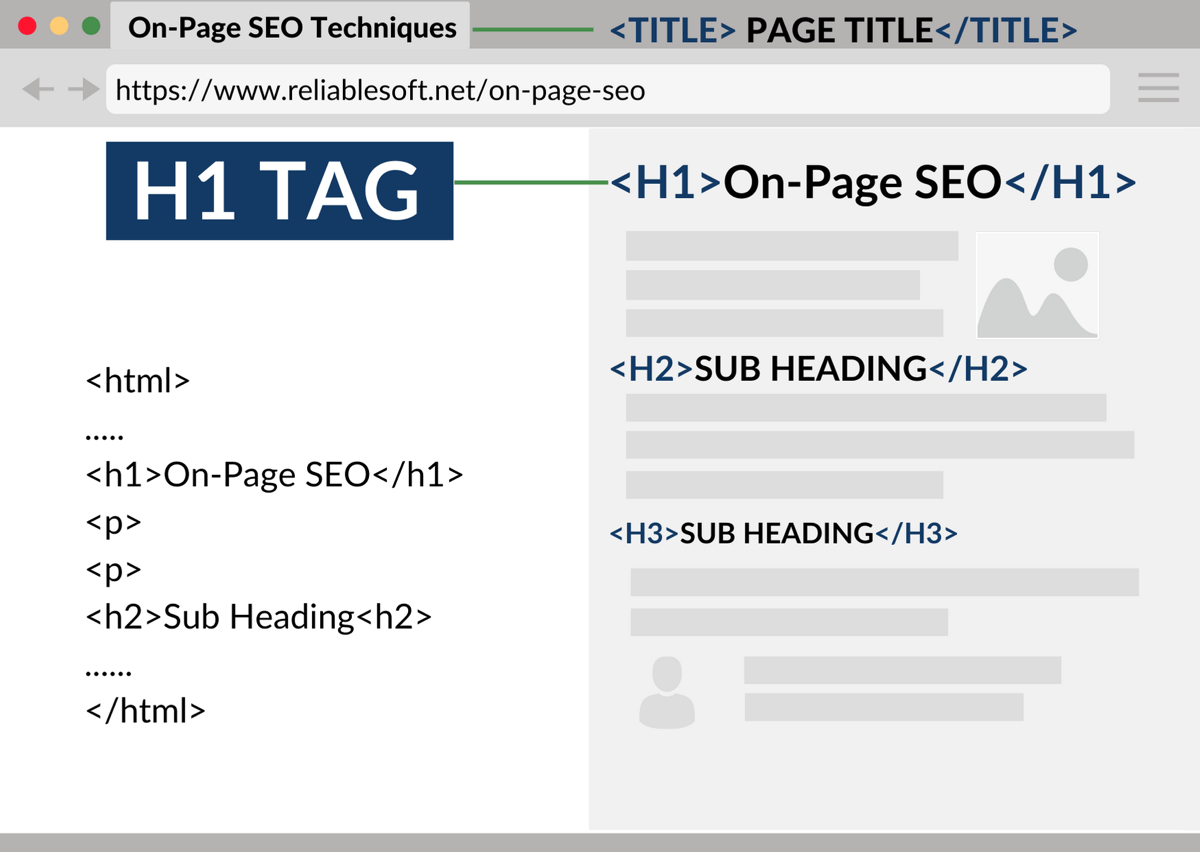
As far as the other headings are concerned (h2, h3), the things you need to have in mind are the following:
- Avoid using a single word for a heading but make your headings interesting and useful for users that like to skim read an article.
- Use headings hierarchically i.e. the first heading tag is the <h1> and then the <h2> and then <h3>, <h4> etc.
- The subheadings are a great place to use related keywords in your content.
Further Reading
- Page Title Vs H1 Tag – the difference between a page title and H1 tag (with examples).
Content Formatting
Do not just throw text on a page but make sure that it is readable.
- Use bold, underline or italics to highlight the important parts of a page.
- Use a good size font (at least 14px).
- Split the text into small paragraphs (max 3-4 lines).
- Use enough spacing between the paragraphs to make the text easier to read.
- Make use of CSS to create sections that stand out and break the text into smaller more manageable parts.
5. Images and Other Multimedia Elements
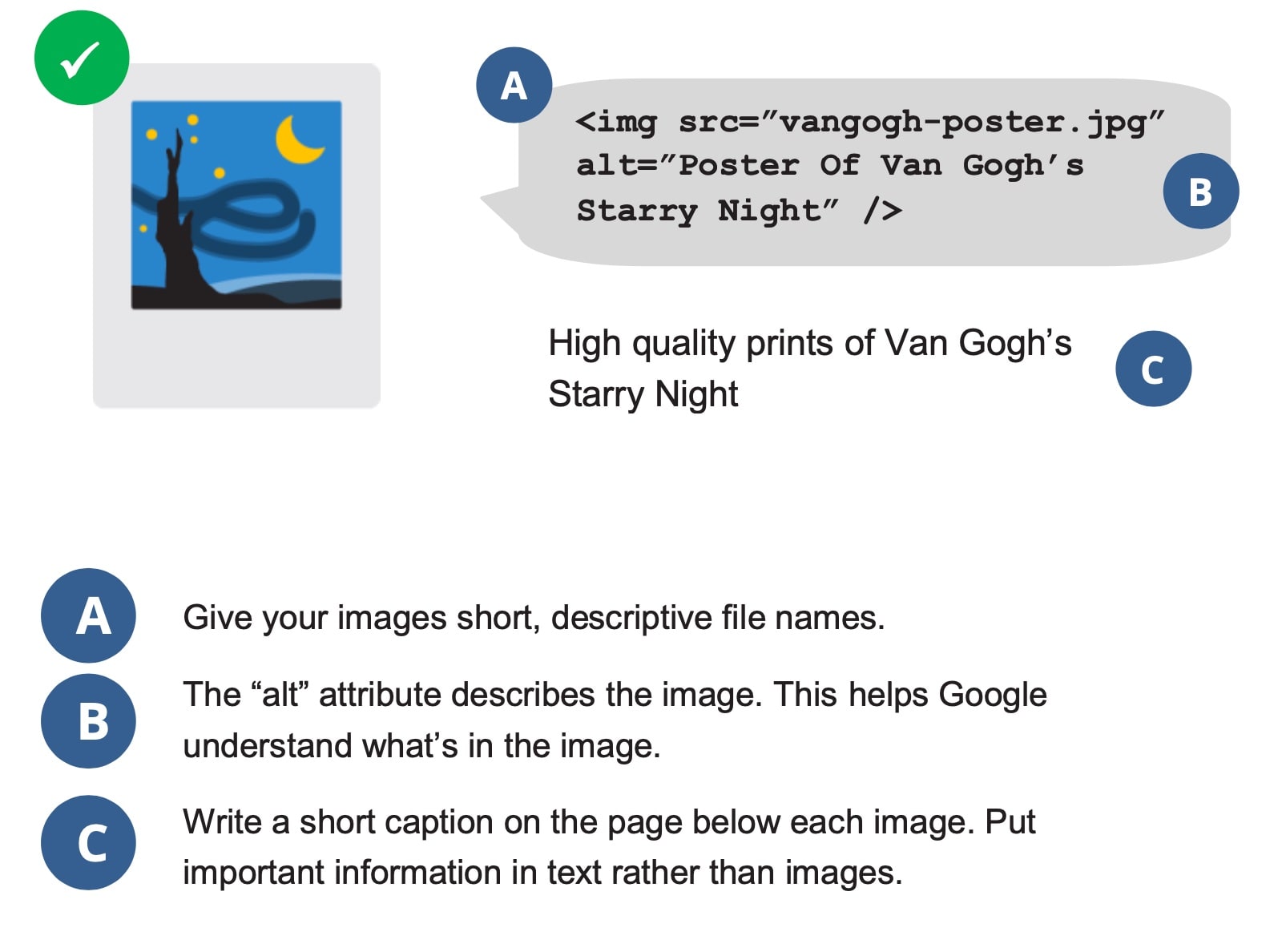
Images are important for presentation purposes. They make a page more interesting and easier to understand.
The biggest problems with images are that search engines don’t understand them and that they add to the loading speed of a page.
Best practices for SEO optimizing images
- Use original images. If you need to use an existing image from the web you need to reference the source.
- Optimize the size of the images – the smaller the size (in bytes) of the image the better.
- Use an ALT tag to describe the image – This helps search engines understand what the image is about.
- Use descriptive filenames – Don’t just name your image ‘image1.jpg’ but try to use descriptive filenames, for example, ‘man-doing-push-ups.jpg’.
- Use a Content Delivery Network – If you have a lot of images on a single page you can use a CDN service that will make your page load faster. In simple terms, your images will be hosted and served by a number of servers and this speeds up the loading process.
Further Reading
- Image SEO – everything you need to know about optimizing your images for SEO.
6. URL Optimization
Optimizing your URLs is important for maximum SEO. It has two parts. The first part is URL optimization and the second is the URL structure.
A permanent link (also known as a slug) is the unique URL of each page.

Good URLs should be less than 255 characters and use hyphens to ‘-‘ separate the different parts.
Just like the page title, an SEO friendly URL is short, descriptive, and includes your target keyword.
These are some examples of good URLs:
- https://www.reliablesoft.net/diy-seo-tutorial-for-beginners/
- https://www.reliablesoft.net/seo-tools
- https://www.reliablesoft.net/search-engine-marketing/

These are examples of bad URLs:
- https://www.reliablesoft.net/p?165 or
- https://www.reliablesoft.net/seotipsforbeginners/ or
- https://www.reliablesoft.net/123131/publish/data2/seo_Tips.html
Best practices for optimizing your URL structure
The URL structure should mimic the actual structure of a website.
Make use of categories – Group your pages into categories to help users and search engines find what they want faster.
It’s like having a warehouse with lots of uncategorized items versus a warehouse with all the items assigned to a dedicated category.
You can have sub-categories as well but my advice is not to go over two levels. For example, a good category structure is:
Homepage > Social Media > Facebook > Article
and not
Homepage > Social Media > Facebook > How To > Article
Add a Breadcrumb menu– A breadcrumb is helpful because it allows users to navigate your website in a structured way since they always know where they are and how far from the home page.
Resources to Learn More
- SEO Friendly URLs – how to create SEO friendly URLs
- Site Structure Optimization – tips on how to optimize your site structure for SEO
7. Internal Links
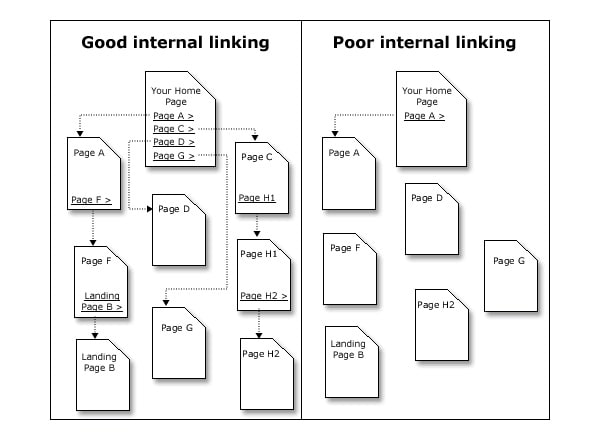
Linking to pages within your website is very important for SEO because:
It’s like building your own web
The first step a search engine spider will do once they discover a page, is to follow the links they find on that page (both internal and external links).
So, when they arrive at your page, if you don’t have any other links within the text they will read your page and go.
If you have links pointing to other pages within your website they will take those into account as well.
It’s a way to let search engines know about your other pages
As explained above when search engines find a page with links, they will go and read those pages too, so you can use this technique to tell search engines about pages of your website they have not yet discovered.
It’s a way to tell search engines which your most important pages are
Every website has some pages that are more important than others. Internal linking is one of the ways to pinpoint the most important pages by sending them more internal links.
It’s a way to increase the users spend on your site
A user that is reading your post is more likely to click on a link to read more about a certain topic and thus increase both the time spend on your website, number of pages per visit, and decrease the bounce rate.
Best practices for internal linking:
- Don’t use keywords only for your internal links
- Add internal links when they are useful for your reader
- No more than 15 internal links per page (this is my opinion and not based on any research or studies)
- When possible, add the links in the main body of your webpage (not in the footer or sidebar)
8. External Links
An external link is a link pointing to a page outside your website i.e. on a different domain. For the website that links out, it’s an external link and for the website that receives the link, it’s a backlink.
We know that backlinks are important for SEO but what about external links?
External links to related pages help Google figure out your page’s topic. It also shows Google that your page is a hub of quality info.
Adding external links to your content will not directly help you with SEO, it’s not a ranking factor but it can help you indirectly.
You can use external links to link out to other websites and then email them and let them know about it. Webmasters will be pleased to know that you have linked to them and this is a great way to start a conversation. You can gradually build on this relationship and eventually get backlinks to your website as many webmasters will be more likely to return the favor.
Let’s quickly review the best practices to follow when adding external links to your content.
- Link out only when it provides value to the reader.
- Link only to websites you trust.
- Link only to related websites that have unique and original content
- Use the ‘nofollow‘ tag for external links going out to websites you don’t fully trust.
9. Page Loading Speed

Google is investing a huge amount of money to make the web faster. In every Google, I/O someone will talk about the importance of speed and their desire to include the fastest websites in their index.
In order to ‘force’ website owners to take speed into account, they have officially added speed as one of the known ranking factors.
So, we know for sure that website speed does matter when it comes to SEO and ranking.
As a webmaster, your job is to make sure that your website loads as fast as possible by taking into account Google’s recommendations. Having fast-loading websites is not only good for SEO but for customer retention and conversions.
Resources to help you improve your page speed
- Page Speed – how to increase your page speed (easy guide for beginners).
10. Mobile Friendliness
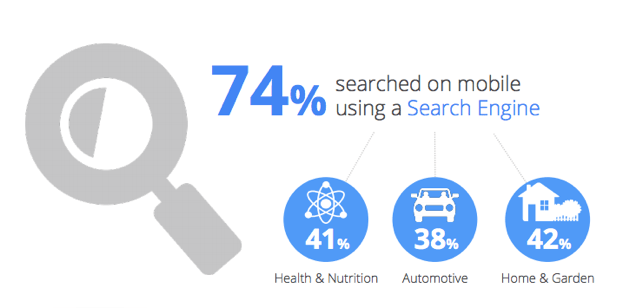
Almost 60% of the searches in Google are now coming from mobile devices. This means that if your website is not mobile-friendly, you are already losing half of the potential traffic.
What should you do?
As a first step, make sure that your website is mobile-friendly. Check your website with the Google mobile friendly tool and fix any potential problems.
Then go one step further and test your website on mobile, like a real user would do, and make sure that everything is displayed correctly including your CTA buttons.
In general websites with a responsive design, have nothing to worry about mobile-friendliness.
11. Comments and On-Page SEO
Many people believe that with the rise of social media blog comments are no longer important, but they are wrong.
Blog comments are still important. As stated by Google’s Gary Illyes, it’s an indication that people like your content and interact with the page and this can really boost your SEO.
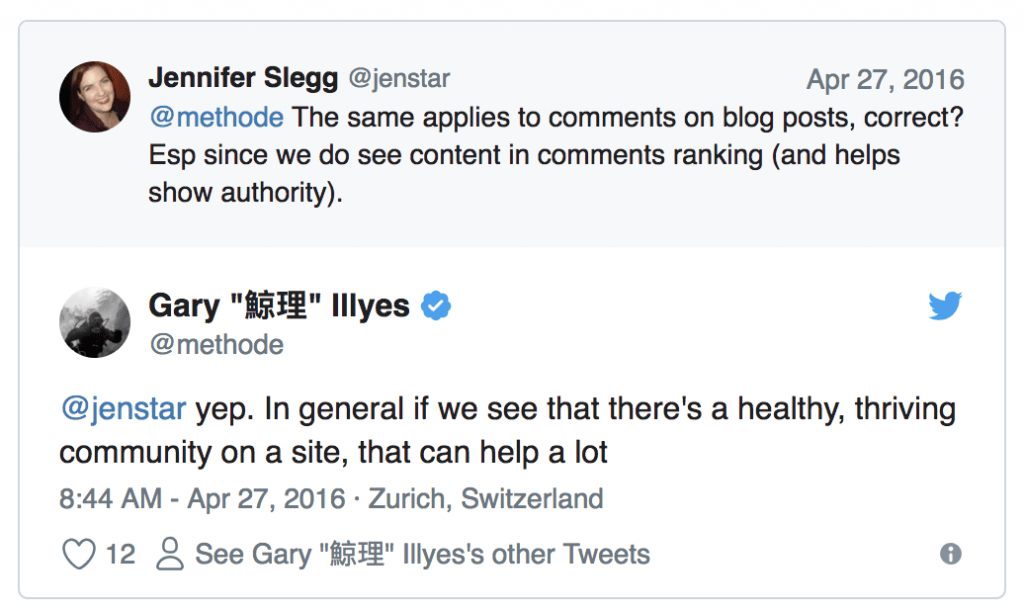
Users before posting a new comment will most probably read the existing comments and this is an additional way to increase the time they spend on the page and your website.
To make the best use of comments, follow these simple rules:
- Always moderate comments before publishing
- Avoid publishing comments that are too general
- Only approve comments that are relevant to the page content and add value
- Don’t approve comments when users don’t use a real name
- Always reply to comments, this will encourage more people to comment.
On-Page SEO Checklist
If you have read the article up to this point, the main tips are summarized in the checklist below.
- Make sure that you understand the difference between on-page SEO and off-page SEO.
- Make sure that your content is original, useful, and well researched.
- Review and optimize your page titles by adding keywords, power words, and numbers.
- Provide a unique meta description for all your pages (include your target keywords).
- Perform keyword research and make sure that your target keywords are part of the title and content.
- Find LSI and related keywords and use them in your headings and content.
- Make sure that your page has only one H1 tag.
- Use headings hierarchically on the page (H1 -> H2 -> H3).
- Beautify your content (use bold, italics, and CSS).
- Optimize your images and other multimedia elements (ALT Text is the most important factor for images).
- Make sure your URLs are SEO Friendly and that your URL Structure mimics your site structure.
- Add internal links to your content.
- Add outbound links to your content (link out to high-quality related websites).
- Make sure that your website loads in less than 3 seconds (both desktop and mobile).
- Make sure that your website is mobile-friendly.
- Encourage comments but only publish comments that make sense.
Is On-page SEO More Important than Off-Page SEO?
To achieve maximum exposure in the search engines and keep your users happy you need both off-page SEO and on-page SEO.
On-page SEO is more important (at least for new websites), and I will explain below why.
‘Speak’ the search engines language
It makes more sense to start with on-page SEO and get it right rather than trying to convince search engines to give you better rankings with off-page SEO.
Search engines are computer programs (software) and they don’t ‘see’ a website like a normal user, but they can only understand code and in particular the HTML language.
With SEO and especially on-page SEO, you ‘speak’ their language. Your goal is to help them understand, by giving them various signals through the structure of a page and content optimization, what a page is all about.
The more signals you can give them, the greater are your chances of achieving better rankings.
On-Page SEO is about the user as well
Never forget that your primary goal is to keep your users happy.
Off-Page SEO may bring traffic to the website but if it is not set up correctly or if it is not user-friendly, the results will be disappointing.
Many websites get it wrong
It’s amazing but it is true that the majority of websites today are not optimized for search engines.
Despite the plethora of information about SEO, many website owners believe that it does not worth trying SEO and they quit before starting.
For those cases, on-page SEO has a lot to offer both in terms of usability and also in terms of traffic.
On-Page SEO is sometimes all you need
If you are running a website for a small business and you need to get local customers searching for various terms on Google then on-page SEO is all you might need to do.
Off-page SEO comes after On-Page SEO
Before even starting to think about how you can promote your website, you need to ensure that it is optimized and in good condition.
So, the first step is to work with on-site SEO and then go off-site.
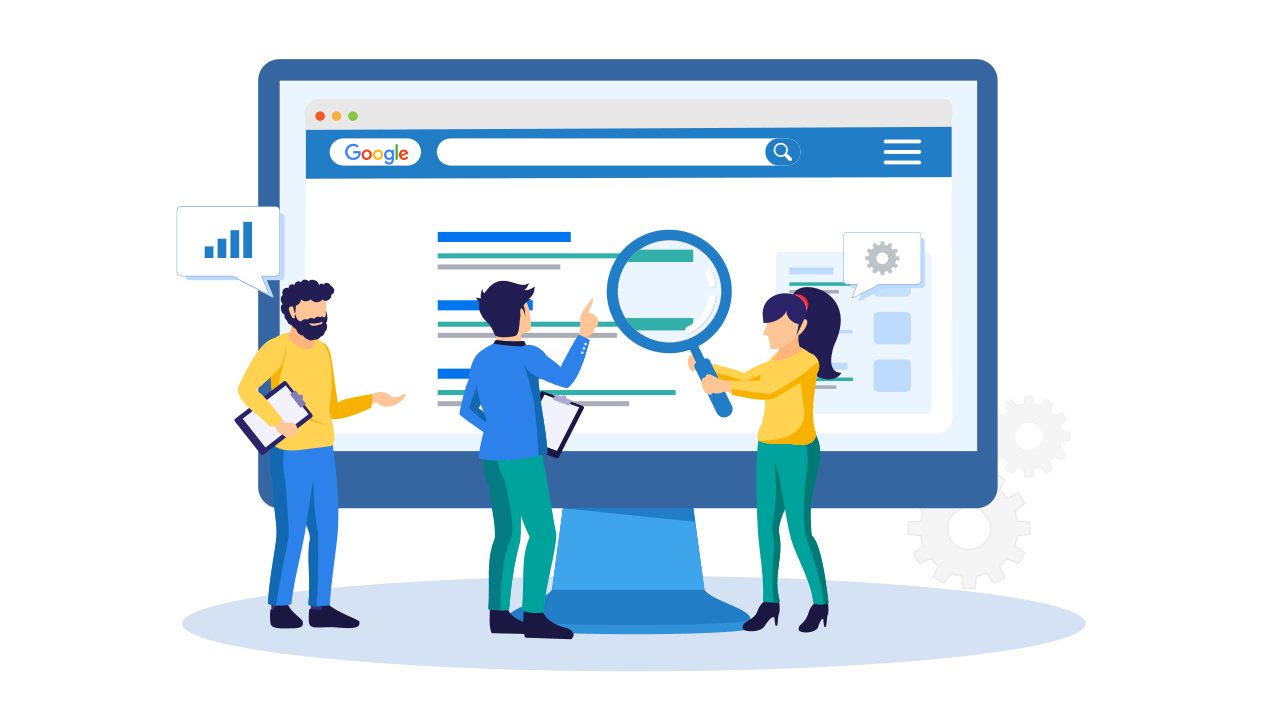
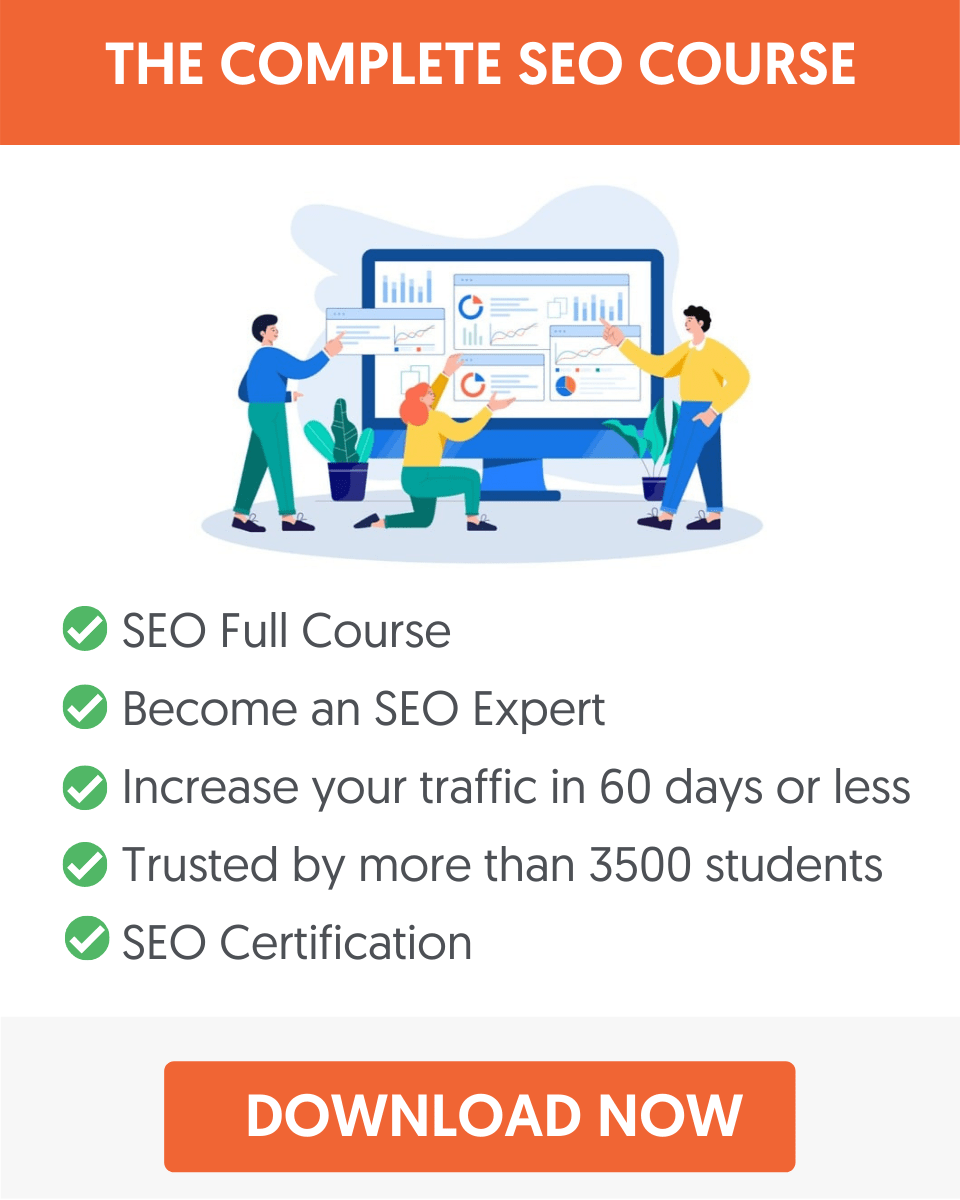

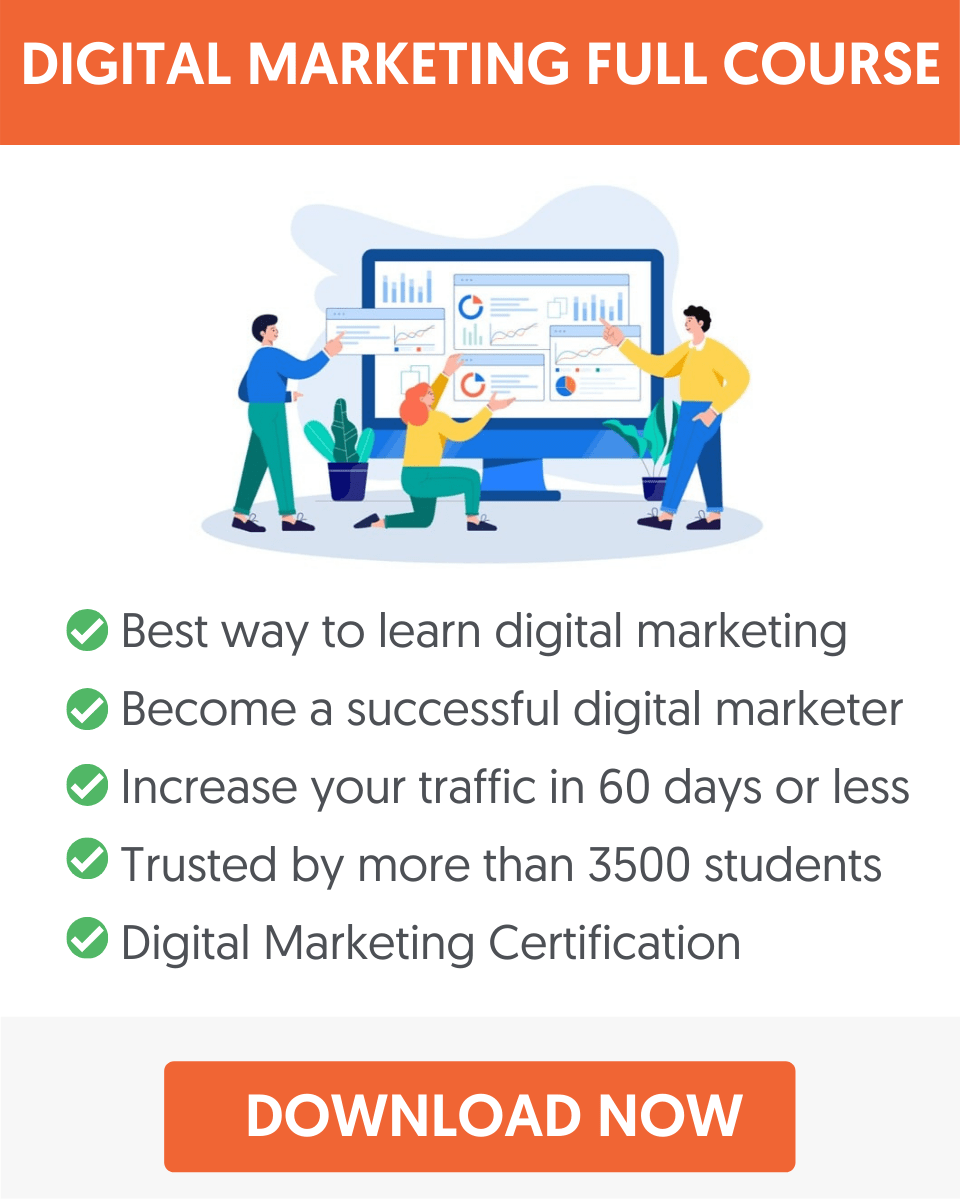

Yes i believe on page optimization is very important for SEO. If you cannot do On page optimization properly it will hamper you website. This post was very helpful for me, thanks for sharing.
Tomm Hi and thanks for your comment,
On Page optimization is the beginning of your SEO efforts. Sometimes on page optimization is all you need to do to start getting some organic traffic. If you get on page SEO wrong it will be harder to get good results even if you do off page SEO
Thanks again
Alex
The on-page SEO checklist you’ve featured is superb! I agree that both on-page and off-page SEO are required in order to gain maximum exposure, however I would also agree that on-page SEO is more important out of the two. Great article – thank you!
Ali Hi
Thank you for your comment. Yes on-page SEO is the most important factor and sometimes doing the basic things can generate great results, especially after the release of penguin 2.0
Thanks again
Nice post.Good original content, well implemented on page optimization and a solid link building campaign is usually more than sufficient for SEO.
Nathan Hi
Thank you for your comment and feedback.
Alex
Hi Alex,
This is a great resource, well written with useful insights.
We are in the process of building our own comprehensive on-page SEO resource.
Cheers,
Josh
Great article you have here, really enjoyed the information
Look forward to reading more posts
Keep it up!
Graig Hi
Thanks a lot for the encouragement!
Alex
Dear Alex Chris ,
Though we know SEO is a dynamic process, Google always change it’s algorithm. I have learn many thing about SEO from the article. This is time to think more about On page SEO and the article is very useful for all webmaster. Plese write something about bad or week backlink which is very harmful for any site or site ranking.
Niaz Hi
Thank you for your nice comments. Please make sure you register to my newsletter and I will post a few articles about link building and off page SEO in the coming weeks.
Alex
I couldn’t agree more, most people completely miss these simple facts. Ultimately content exist for users not robots, so it should be done accordingly. On Page SEO mostly comes down to understanding how write for people, so following the standards in terms of organization and communication that newspaper publications, academic papers, and books utilize will definitely impact results. Great post!
Roberto hi
It is true that while on-page SEO is simple and straightforward, most websites get it wrong. Newspaper, academic papers and books are great examples for publication standards!
Thanks again
Alex
If we bold a simple text , is it categorized as a keyword ?
Rahul Hi
No, if you bold text that does not mean it is a keyword. You can use bold to draw the attention of the user to specific parts of your text.
Hope this helps
Alex.
Then what makes a text a keyword with respect tot he search engine ?
Instead of just bold – should we bold and italic it or underline ?
There is really no need to do that…search engines know which are the keywords and you don’t have to make it bold or italic or underline. This was a practice we used in the past but today I don’t see any benefit from doing this
Nice post
Is off page really necessary after penguin update
As you stated on page is a must I agree with that but i think off page activities like Link exchange, directory submission etc all are fake now a days
i think only contents which are original will gain weight for ranking
What do you say?
Zeshan Hi
Thank you for your comment.
I agree with you, high quality original content is the most important factor these days and social media is the new link building. If you do any of the activities mentioned above like link exchanges, directory submissions etc you are not only losing your time but you risk getting a penanlty as well
Alex.
It means according to you off-page SEO is waste of time?
No, not at all. Low quality and spammy link building IS a waste of time but QUALITY link building is not.
I love to read accurate tips in terms of effective SEO techniques that will boost rankings. They’re really great, thank you! I’ll be sure to bookmark this page 🙂
Ree
Thanks a lot of you nice comment!
Alex
Hello sir,
I am new in seo field. I want to know how I can get better page result on google with off page.
Krishan Hi
You can find all the info about off page SEO here: https://www.reliablesoft.net/what-is-off-page-seo/
Thanks
Hi,
I have one question. Why we cann’t do most relevant directory and link exchange?
Sili Hi
The answer is simple, both these techniques are not natural ways to get a link so if you are ‘caught’ doing it, you will get a penalty by Google. Think about it this way: what is the real purpose of directories and link exchanges? If the answer is: to get a link back to my website to increase rankings then it’s obvious that this is violating Google guidelines.
Hope this helps a bit
Alex
Hi Alex,
Thanks for the quick response. I am a link builder. And in this present scenario what is the future of a Link Builder? What would be the effective method should a link builder follow to get the rank?
Sili Hi
2 things come in mind:
1) Quality guest posting: https://www.reliablesoft.net/is-guest-posting-a-valid-way-to-get-links/
2) Social Media.
Nevertheless I still believe that concentrating on producing high quality content is the way to go.
Thanks
Alex
Hi,
please let me know why we use the robot.txt and how to do?
Thanks
Ayaz Hi
Robots.txt is a way to tell search engines which pages to crawl and which to ignore. You can read about it here: https://support.google.com/webmasters/answer/156449?hl=en#156449
Hope this helps
Alex
Can I use a company Google+ profile to do authorship?
Allison Hi
No, you need a personal Google+ profile for the authorship to work. A website should have a publisher profile as well (this is bind to the Google+ business page) but for authorship you need to also relate your posts and pages with a personal G+ profile
Thanks
Alex
Hi,
This post is really very nice and informational.I got many new things from it.Its really very useful.I am new in SEO field and it clears my most of doubts about on page optimization
thanks
Anu Hi
Thank you very much for your nice comment. Once you get the basic knowledge about on-page SEO, everything else becomes easier
Thanks
Alex
Hi,
Im working on seo for our site and this post is really helpful for me to work on page seo and also i clearly understood about on page seo. Thanks for this post.
Excellent and well explain. Quality content is the king around getting found. Thanks for posting this great list.
Hi,
First of all thanks for this wonderful post. I usually wonder why people work more on off page rather than on page. I had my personal opinion to make the structure of the website intact and then try to promote it. And, This article told everything what i wanted to tell my colleagues. Thanks again.
i sincerely agree for the above post.. ON optimization is like a foundation of a building , if foundation of the building is strong you can build many floors , (same in seo if on optimization is strong, then only your off optimization works.
Charan Hi
Very well said…on page SEO is indeed the foundation for a strong website.
Thanks for commenting
Alex
Thank you Alex, the checklist has been extremely helpful to me.
I never done all the activities manually, as I have been using website auditor and it just scans your site and gives detailed on-page suggestions along the way.
Still, I got some interesting insights from your post, especially with regard to internal linking and authorship. Great share!
SEO by YOAST is the best plugin for ON-Page SEO ever. For new and pro bloggers too, its the best
Thank you very much Alex Chris.This post is really very good and informational.
i have one question, What is latest techniques in OFF Page SEO?
Syed hi
I have written a whole post about off-page SEO here: https://www.reliablesoft.net/what-is-off-page-seo/
Thanks
The article is worth praising, all the techniques are very well explained and every technique is unique in its own manner. There are more techniques which you can include but what ever you have carved it explains every point in exact manner what it need to be done.
Hi Alex,
Good stuff. I like the small infographic or image you had (the 5 rules or points part).
I think writing for humans is important but don’t ever forget SE. Practicing a balance of both is hard but very much possible. Not forget, it gives better results too.
Reginald
nice article alex, this will help to get more details regarding seo services for begginers as well as professonal people keep it up. i’m expecting this kind articles from you. thank you sharing valuable information.
The On-Page Factors (or) Techniques in SEO is:
1)Title Tags Optimization
2)URL Structure Optimization
3)Meta-Description Optimization
4)Meta-Keywords Optimization
5)Body Tag (or) Header Tag Optimization(H1,H2,H3,H4)
6)Keyword Density
7)Image Optimization
8)Anchor Tag Optimization
9)Internal Navigation
10)Redirection Technique (or) Optimization(301 it is an seo friendly (or) static redirection & 302 is a temporary redirection technique and it is also consider as a black hat technique)
11)Sitemap.xml Optimization
12)Robots.txt Optimization
13)RSS Feed Optimization
14)Footer Tag Optimization
15)404 Error Optimization
Hi surya
Great on-page SEO List!
Thanks for sharing
Alex
Great information here,specially for beginners like me. My site ranking for targeted keywords has improved a lot after applying this awesome points.
Hi Nic
Nice to hear that our post has helped you.
Keep up the good work
Alex
nice tips for SEO beginner
What is your point of view on meta keywords as part of the Source Code. Your article talked about meta titles and descriptions, but I missed your thoughts about meta keywords. Thanks! Margaret
Margaret Hi
There is no need to add meta keywords as these are ignored by search engines.
Thanks
Hey Alex nice on page seo tricks. but can you explain off page seo tricks?
Great tips. I’m going to work on this all night, thanks!
Your SEO article is great.I think this is the best seo article I ever read. Thank you very much for sharing this.
I have one question, how the page rank between android phone and windows pc is differ?For an example, when I type something in google search, say “best sport car 2014” I found a search result for a same blog appear in 1st page in android but in 3rd page in windows pc.
Hi
The ranking position of a keyword is different when viewed from a desktop browser and from a mobile browser because mobile optimized websites can achieve better rankings in mobile search than websites not optimized for mobile browsers.
You can also read this for more information: https://www.reliablesoft.net/advantages-of-responsive-design-for-online-businesses/
Hope this helps
Alex
Nice and very informative article Alex. thats very helpful for newbies. i love your writing and appreciate your skills.
I’m a Newbie in SEO Field. SO this post very useful to me for better working in my field. Thank you for this valuable article. 🙂 🙂
That is the most detailed post i ve ever come across with first time explaining on page SEO benefits rather than off page SEO. hats off and i am 100% agree with everything you written above
Cheers
RanaWaqas.Com
Hey Chris,
Really a very good piece of information. I have read many of the tips here on many occasions. But the last one namely Speed is the new one for me. Thanks for the cool info mate.
thanks for great tips of on page seo, it’s really useful for me as a beginner 🙂
Nice article, got lot of help from my new site, and 100% agree with you, we are trying to do some things like as per your advice, thanks Alex for sharing.
Two more factors that I consider valuable for on page seo is to make your website mobile friendly and definitely moving your website to SSL servers can give you boost in ranking. The on-page seo is changing with time.
Absolutely right..!! Fresh/Unique content will automatically perform well in SERP.
Keep in mind on-page SEO,I changed slug of my old post,now what will happen will old URL?Is it good for SEO to change slug.? Thank in advance.
Great, You have included the Whole industry in this awesome post. Great Keep updating and make it Evergreen..
Thanks a lot for Posting.
Superb information regarding on Page SEO thank you Alex for writing such a nice article .
Really helped me a lot.
Good work keep writing more interesting posts.
Thank you so much
Hi Chris,
great information about on-page SEO!
Every blogger should keep these points in mind.
Aside on-page SEO, we need to work also on off-page SEO, as Google still loves links, a lot!
Thanks for sharing.
Have a great week.
Hi Erik
That’s true, you need both on-page and off-page SEO to get some really good results.
Thanks
Alex
All the points are explained very clearly, Great source of information about on-page seo strategies that boost the rank. Thanks for en-lighting us with your knowledge, it is helpful for many of us.
Thanks for great tips of on page seo, it’s really useful for me as a beginner 🙂
thanks for great tips of on page seo, it’s really useful for me as a beginner
I have a question. Have any impact on Google ranking for creating About, Contact us and Privacy Policy page?
Hi Bob
Not directly but indirectly. Any legitimate website should have an about us, contact us and privacy policy pages so if these pages are missing this is a bad signal.
Hope this helps
Alex
Thanks a lot for this great piece of information. It helped me a lot
First of all thanks for this great post. I usually wonder why people work more on off page rather than on page. I had my personal opinion to make the structure of the website intact and then try to promote it. And, This article told everything what i wanted to tell my colleagues. Thanks again.
Hi Thameem
A good site structure is one of the most important SEO techniques to adopt and this is something that will also make your website SEO friendly.
All the best
Alex
hi
nice posts and share beautifully tips.
God Bless You!
Amazing post Alex, thanks. The only thing that I feel is you missed the point of responsiveness of the website.
Hi Mike
True. It is now added (article last revised, December 2016).
Thanks
Alex
thanks for your information, can i ask what is links building and why it more important? i need seo ebook for beginner can you give ? thanks advance
Very lengthy and descriptive article! The importance of on page SEO is more than just what many bloggers think it is!
Great article!!!!
Very Detailed Article. It has Discussed a Every point. I really impressed and It tough me alot. Thanks for the share
Great content posted. On-page SEO is powerful, if you update your website into a well contructed on-page SEO even you dont have enough backlinks or off-page SEO, you can still be on the top of the search engines.
Hello
Well, Greatly described Points. But I agree with most of your points.
Recently Google become more intelligent with quality update and now, they they know, what content is all about, so they know, exactly, where to rank our article, depending on it’s quality.
So, Keyword Density is out of the window these days, Instead, we can just use LSI keywords for better ranking.
Also Meta tags like Meta description is not that important, like it was few years ago, now, Google can pick any word or phrase from article depending on users query.
But I do agree that, using Headings Tags, Image Alt Tags and internal Linking is very important.
So, Overall, having a nice URL structure, Authority Outbound Links, proper Title, can do the Job easily.
Correct me, If I am wrong?
Hi Jasvinder
I agree with you, my only comment is the word ‘easily’. A nice url structure, good links, and good on-page SEO can do the job but it takes time and needs a lot of work.
Thank you for your comment
Alex
very nice tutorial for on page seo,excellent work………
some of the Onpage optimization in SEO are Finding broken links, Meta description, Alttag, Title tag, Inbound link, URL structure etc are the technique which I use to follow. Great Post. Thanks for sharing this article.
Nice Post. thanks for the share
Great post Alex, it’s useful to understand how your site can benefit from on site optimisation and improve rankings through value added content.
Hi Kavita
Thanks for your comment and nice words.
Alex
Very nicely written ! helped alot . Thanks man!
Thank you as well, glad I could help!
thanks for this Excellent article for beginners in seo . It would be interesting to also talk about the Knowledge graph.I think this is one of the parameters of the future of search
Once again a great post Alex .I think both the on-page and of-page SEO are important to rank on google or any other search engine .
A note about the image file names… your example has spaces in the filename. That might confuse beginners. “Man-doing-pushups.jpg” might be helpful for newbies.
Hi, Alex!
Excellent content posted. On-page SEO is powerful, if you update your website into a well-constructed on-page SEO even you don’t have enough backlinks or off-page SEO, you can still be on the top of the search engines. Fresh and Unique content will automatically perform well in SERP. You can also add a social login to boost traffic.From SEO point of view implementing social login drive a huge number of visitors to your website since it makes the registration process simple and quick. Really great tips of on page SEO, it’s really useful for me as a beginner.Look forward to reading more posts
Keep it up! Thanks for sharing!
Hi Gloria
Thanks for your nice comment. Make sure you register to my newsletter to receive my new posts.
Best
Alex
With the effect of building bad links as part of off page, optimizing a website’s on-page is much safer. However should one get it wrong then it could immediately send the site to hell. I loved the fact where you said “Speaking the search engine language” 🙂
Really Nice and all those correct.
Thanks Sanjay.
Good post. I believe on-page seo is a very important factor in ranking a website. Very long and interesting post.
Great content posted.
On-page SEO is powerful as well as OFF-PAGE SEO, As I have triedI don’t have enough backlinks or DA or PA. Yet One of My Post comes on 1st SERP. because of On-PAGE SEO. You also can be the top of the search engines. As Google, only Considering the Fresh and Unique content which will automatically perform well in SERP.
Thanks dude for sharing great On-PAGE SEO techniques.
Thank You
Hi Alex,
it is fantastic article.you fefine very well.all the topics which you defined like (link building,content,URL) are very important for seo.i like it very much.thnaks for sharing
A website ranking is hidden in On-page SEO and I think the strongest the On-page SEO the higher the chances to rank in search results.
Internal Link & URL Structures are the basic things we should Focus on as well as on other jorgans.
Thank you so much for sharing.
Wonderful article. Robots txt and sitemap is also most important for the website in seo. Good Information for the beginner seo.
Thx for sharing. You have covered a lot of ranking factors in your post. So it is very helpful. Day by day SEO has changed a lot. You have covered everything about On – page SEO. Is Google authorship working now? Someone tell it’s not working now blah blah blah! Is Google changing their rules about Meta Description? I will come back again and find your answer. Overall your post is a complete guideline on On – page SEO. It’s very helpful.
Thank you Josh, all the best with your SEO efforts.
Alex
I have to agree with this post especially at this particular advice “Earn links with great content”. Indeed, of you are going to link build then make sure you get yourself a number of quality backlinks. Not only are you setting standards for your page but also increasing the relevancy of the content of your site.
hi i love this post related to the seo techniques. Google regularly changes it update. In that scenario, it is very important to follow fair seo techniques.
Hi
If you follow solid SEO techniques and practices, you don’t have to worry about Google updates.
Best
Alex
Along with website site speed, mobile friendly etc i also think that website DA PA also plays a very important role and also how webmaster is updating content .
Hi Alex,
I have a question re: content length. Does your 1,500 – 2.000 word recommendation apply to site pages as well as blog posts? All the locally targeted keywords relevant to my site are highly competitive, and I’m trying to figure out how much content I should shoot for on each page.
Thank you!
Hi Vivily
The best way to find out how long to make your blog posts or pages, it to search Google for those keywords and study the first 10 results. This will give you a good indication on how much content to provide. Of course, don’t forget that it’s not always a matter of quantity but quality.
Hope this helps
Alex
Hey Alex,
Thank you for sharing such great insight on onpage seo.
I have surely learnt a thing or two.
Thanks for sharing and do have a wonderful day ahead.
Really good information!
Seo can be verry difficult. Because it is changing every day. I had a page on page 2, after it went down to page 3. In about 3 weeks it was on the first page. I really could not believe it. And i did know what to expect from it.
You really have to keep going on, and keep on changing and moving. If you leave it, you can’t track the outcome, maybe you will end up on page 1. But i think you will and up on page 5.
Reading more of your posts!
Thanks and cheers
Hi,
What about the position of content in the page (html code)? Does it help if the content is placed first and the navigation menu is after (using float or position absolute)? Thanks
Hi
No, not at all. Google is clever enough to distinguish between actual content and navigation elements (or other design elements of a page).
Thanks
Alex
The problem is that I manage an e-commerce site and the navigation has ~160 internal links to categories. I believe that this navigation menu, being placed before the actual content, negatively influences the pages’ main subject, confusing the search bot. For eg, in the Laptops product listing, the search bot will process the navigation menu first (which contains sub-categories for smartphones, TVs, gaming consoles etc) and I think the search bot might think that the page is more general, because of the variety of keywords in anchor tags. I saw this technique at other competitor websites (which rank higher), I don’t think it’s black hat seo (it’s the same html code for the search bot and a real visitor), I’m just worried that the search bot might not understand the real content and use of the page.
Thanks
Hi Mike
It’s not black hat SEO for sure and if you have the technical knowledge to do that then go ahead. Making the job of the search engine bots easier, is always a good think.
Thanks
Alex
Thanks bro for providing these useful on page seo techniques, it really gona helps to privide best results for my site 🙂
Thanks for sharing some on page SEO techniques i hope it’s helpful for my blog.
Great article Alex. What’s your take on SSL certificates? Do you think SSL-certification plays (or will play, in the near future) a significant role in boosting a site’s rankings?
Hi Syd
SSL is important and it will become more important in the near future. Other thighs being equal, an https page will rank higher than a non https page. Besides the ranking advantage, having SSL is also good for the ‘user trust’, which is equally important.
Thanks
Alex
Thanks Alex 🙂 All great fundamentals – look after this kind of stuff and Google will reward you with traffic 🙂
Thanks a ton for this valuable information. I’ve started implementing all the above you mentioned.
On-page optimization always prioritizes off-page optimization – to ensure your visitors are engaged on your site. The tips you’ve provided are really helpful, especially that concise checklist in the end section.
Hey Alex,
First of all, I want to thank you for this article. Really good and much-needed information for every blogger.
Actually, I am new in blogging, your on-page strategy helps me to optimize my blog post.
Thanks again.
Agreed with your first comment and post, some are starting to do only onpage seo as this is what google respects the most and cannot be spammed
In a less competitive niche you can certainly rank well with only good on-page optimization but with many niches you do need a good overall off-page link building campaign. Creating good content and reaching out to sites in your niche to share it with them and asking for a link back is a good place to start.
Hey Alex,
As far as I know, URL structure & Load time are the ranking factors that can be followed easily by a webmaster to rank their sites higher than before.
Your article & references did help ME!
Thanks 🙂
Greeting!
Alex You’ve great brain 😀
Really i’m so happy today i’m working in a software house as seo expert i can say that i’s only because of you and your articles
Stay Blessed 🙂
Nice Article…Alex
i want just say without On-page SEO, you can not perform Effective Off-page SEO.
Thank you so much for that article. You explained SEO so well and I am no longer confused. Thanks for making SEO so easy to understand. Now I can apply this knowledge to my own website.
Thanks for sharing these relevant tips on On page SEO , SEO experts can’t overlook these SEO factors for Incrasing ranking of their site in search results of Search Engines
Ultimate Guide.
Thanks.
I think building do follow & high quality contents to a site organically can also boost site’s traffic.
Miss it.
Alex, This post is really informative for me..
I have learned some new tactics today with this post and I am going to Implement them and Share the results here! 😉
I want to Thank you for this detailed Guide…
Hi Alex,
Great post and useful information for on-page SEO optimization. Definitely, on page optimization counts in ranking but from my experience, the most important of all ranking is site authority.
On page SEO (including technical seo) is literally the 80-20 when it comes to ranking. Once you have the technical aspect & basic on page techniques set (as you mentioned) it takes a lot less links to get to the #1 spot. Great article Alex!
Wheb it comes to SEO, On page optimization counted as important part. In your post I very useful information to do better seo for optimize blog post. Thanks Alex
Hi Alex,
How can we optimize a website for Voice search feature? Your advice is appreciated.
Hi
This will help: https://www.reliablesoft.net/how-to-rank-content-in-googles-featured-snippet/
Thanks
Wow! What a great guide Alex. You have explained everything very well. On-page SEO Tips are just awesome. Thank you so much.
Thank you so much for that article. You explained SEO so well and I am no longer confused. Thanks for making SEO so easy to understand. Now I can apply this knowledge to my own website.
Hi Alex,
Thanks for sharing this informative blog. I didn’t have much idea about page categorization and posting videos on website include text description. Thanks again
Hello, Nice article. I’ll try these techniques on my blog to boost ranking.
Hi Mac
Yes, try them out and let us know how it goes.
Thanks
Hey Alex! I must say you nailed it! The most detailed on-page SEO article that I’ve found.
I was doing some research for my next post, and I think I came to the right place, where I can find everything about on-page SEO. Very good job Alex!
Will make sure to include this page on my next post, because it is so valuable!
Thank you David!
Send me the link once your post is ready.
Alex
Well written..Thank you so much for sharing the information
This helps to improve my website ranking
Great article Alex! I have been reading so many articles talking about backlinks and content being the best way to move up and rankings but this article changes my mindset a bit. Thanks for sharing your thoughts!
Thanks for sharing this valuable info about the SEO, It will really help me to improve my site rank, I will definitely try these techniques on my website.
Thanks for great article Alex, my all doubts have cleared. Can I use H2 and H3 more than one time and can I link other websites as H2 or H3?
Hi Aditya
Yes to both.
Thanks
Alex
Thanks for sharing these great techniques. Will definitely help in making a post perfect.
Great post and useful information for on-page SEO optimization. These are the good techniques how to get rank your website on first page.Use SEO-Friendly URLs, Start Title With Keyword, Use Responsive Design and Use Outbound Links are the strong on page SEO techniques you have mentioned in your post.
Solid list. Quality content seems like it’s become a cliche but “seo-focused content” that doesn’t serve user intent just won’t get the job done.
Best SEO technique as per my thoughts is the In-Depth article that provides all the related information of the topic at one place. This is very helpful to get rank in top of google search result.
The content of your website is really good. You have a good knowledge of on-page SEO, really thankful to you. Keep posting. Keep growing.
This seems to be like a very good post! We have to follow this on page SEO techniques in order to boost your website on top of the search results.
For quite a long time now I have been following your posts. I must say that it has benefited me and many like me, a lot.
It’s 2019, the world of Google and Facebook, and if you want to be a successful entrepreneur or a business owner you cannot ignore Google and Facebook.
SEO is the best and economical way to earn more business through Google. But, to be honest SEO these days is difficult. Without on-site SEO you cannot rank your website on the top of the Google.
I believe that backlinking is still an essential element that helps in gaining top page rank. But, every SEO professional should keep in mind that without an excellent on-site SEO gaining a top page rank is almost impossible.
Anyhow, this post is great! Anyone who wants to learn on-site SEO should read this post carefully.
This is a complete guide on what you can do on the site. All the Techniques mentioned are useful and help you in getting good organic results. Thanks for sharing this piece of content.
Hi Alex Chris:
I’m very glad to read easy on-page techniques. Even the beginners will know how to develop their site and generate the traffic to their site.
The external link should be the do follow link or no follow link?
The checklist you have given is really amazing.
Thank you for your valuable lore.
With Regards,
Jennifer marry
I have read your blog it is very helpful for me. I want to say thanks to you.
For SEO, both On-page and Off-page Techniques are very important. This blog is very useful for me to optimize and boost ranking for my website. Thanks for sharing.
Yes, I believe on page optimization is very important for SEO. If you cannot do On page optimization properly it will hamper your website. I must say
the on-page SEO checklist you’ve featured is superb.
This post was very helpful for me, thanks for sharing.
Every blogger wants to write a stunning blog post that the visitor attract their blog. You have given some points to write stunning blog. There are very helpful for blogger. You covered all point regarding how to write professional blog post. Thank you so much for sharing. Have a nice day!
Thanks for sharing information. Really it’s helpful for us and also for beginners. These new techniques help to improve ranking on search engines.
Excellent on page SEO factor that you have shared here, thanks a lot
I’m using wordpress, the header tags are arranged by default H1 for the first header and the rest are labeled H2. Some posts have like 4 H2s. Does this harm my seo?
Hey,
This is really a great resource for every webmaster who wants to gain traffic for there website organically.
Your SEO techniques are very informative for me & a huge thanks for this valuable content!
Great post!! There is no need to include your domain name in the title because this is added automatically by Google. You have to make use of 60 characters to provide an accurate title of the page.
Amazing techniques are described in this article. I got much knowledge from this.
Thanks, Thanks a lot.
Hey, Alex Chirs,
Thank you so much for your sharing. I am a professional SEO Specialist. Your post is really very informative post.
Hey Alex!
Great content! I have one doubt and would like your advice.
If we are focusing on more than one target keyword on a single blog post, then how exactly do we start our title?
Hi Steve
It’s not a good idea to target more than one keywords with the same post. You will minimize your chances of ranking for any of the keywords. Better keep to a single keyword per post and use synonyms and related keywords in the body of the post.
Hope this helps
Alex
Amazing content! This will really help the beginners to learn more about On-Page SEO. On-Page SEO is really very important to cover in Digital Marketing and the tips you gave would Actually help the beginners.
The important part of the SEO is one should consider the user’s perspective rather than to satisfy only the search engine needs.
Overall amazing article for the beginners to learn SEO in good manner.
Hi Mayank
Thanks a lot for your comment. Glad I could help you learn one aspect of SEO.
Thanks
Alex
Very informative article about on page seo. Alex you have covered in depth about on page factors. thank you.
Hi Alex, This article is very informative and instructive. My website is just 1 month ago, I Implemented every On-Page SEO there is. However, the first challenge for new blogs like mine is building links. I would really like you to talk about that.
Thank you Alex
Have a good day.
Finally a complete list for On-Page SEO. All the other lists I was checking were lacking some stuff. Thanks for putting it together.
Hi Matt
Thanks a lot for your comment. All the best with your on-page SEO efforts!
Alex
Hello sir, I really love to read this Article. This is complete Tutorial About On Page SEO. On Page SEO is the key of Organic Traffic.
I am into SEO since 2014. Since then till now a lots of things has been changed for both On Page SEO and Off Page. After reading this article I am feeling that my On Page SEO knowledge was incomplete and a little bit immature too. Thanks for the vitals points and elaboration.
Another amazing SEO blog post, thanks! So informative , and all of the information is up to date and relevant to 2020 . I use your guides to train my in-house team and look forward to the next one.
Hi Rihan
Thanks a lot for your nice comment. All the best with your SEO training efforts.
Alex
thank you so much sir for a complete checklist of on page SEO techniques. I’ve been searching for such a list for a long time and finally, I got it in this post. It really helped me in performing SEO for my own website. thank you so much.
Hey Alex,
Great article on how to optimize content. I had a query on the use of inline images. Is it okay to use inline images as a part of a ordered/unordered list ? Would it affect the ranking in any way ?
thank u for sharing onpage SEO techniques . I have a query regarding pages canonical issue . What kind of difference between URL canonicalization & page canonicalization ?
Yes Alex!
On page is sooo important.
I’ve gotten much better results since I focused totally on optimization especially for snippet optimisation and trying my best to answer questions.
Snippet optimisation and FAQ schema can boost your on page optimisation as well. At least worked for me :))
Thanks for the content
Really , Really ,Really ❤❤👌 Great post for Beginner
I am a beginner in the SEO field and doing an offline digital marketing course currently.
When I learn any topic related to SEO in the course, I come to your website and get more clarity about that topic through your informative blog posts.
This On-page SEO checklist article will be very useful for me and I created a Mindmap while reading this guide so that I can easily refer back to the important points to consider while doing On-page SEO.
Thank you so much Alex for this valuable article
It’s great to post a nice effort by the writer well explained about on-page SEO.
Such a Great Value man!
Hi Alex,
Was searching for the topic On-page SEO and end up with your content, seriously got great value from your resource, the way in which the entire article is crafted was awesome.
Thank you once again Alex for providing such a great piece of knowledge to us.
Another best post about SEO. This is indeed very helpful. Thankyou for sharing with us.